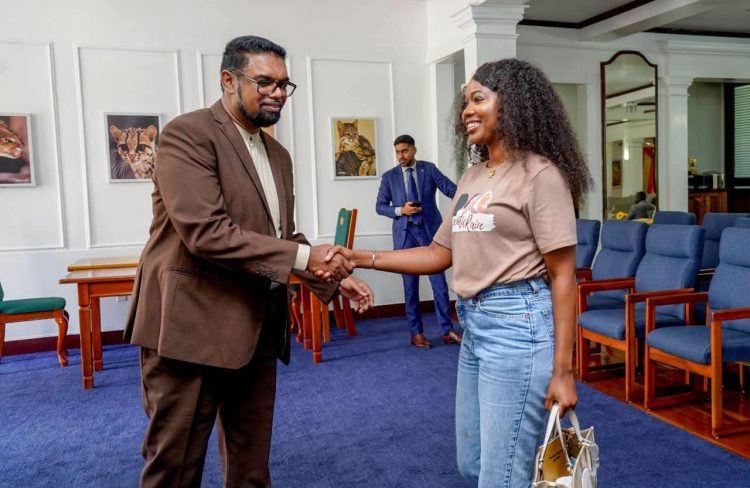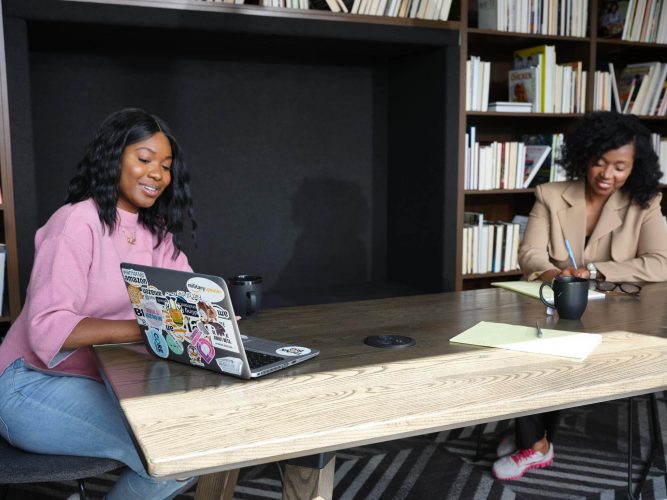Whether it was a ‘sweetie’ stand in front of their home or selling leather belts to tourists, Tiffany Johnson’s parents were always into some form of business so much so that when their young teenage daughter moved to the US she followed in their footsteps and made money from shoveling snow. Today Johnson is the woman behind Amazon’s Black Business Accelerator (BBA), a US$150 million pledge to help black entrepreneurs with capital, mentorship and marketing support.
Now the 28-year-old is exploring ways of not only making Guyanese youths business oriented but also to get them to think beyond their country’s borders and serve customers outside of Guyana. In that vein, one of the immediate items on her agenda is holding a digital conference in Guyana but also targeting other Caribbean countries.

(Office of the President photo)

“My parents were business owners, very business savvy. It started in Linden, Guyana. I remember we had a little shack in front of the home [where] my mom would sell candies, icicles and we then migrated to St Lucia… And my mom and dad they started building from scratch all over again selling mints and candies and I saw that business evolve into a real income generating tool for us to build. So sort of generational wealth for my family,” Johnson told this newspaper in a recent interview.
Experiencing the growth of her parents’ business saw Johnson develop a yearning to problem solve. According to her when one thinks of a business they should think about solving a customer’s problem.
“A lot of things that my mom sold when the business evolved were … African movies, leather belts, leather sandals from Guyana as well as resources [from] the states (US) that a lot of the islanders didn’t have access to,” Johnson further expounded.
Their business, which was in the form a temporary shed, at that time was in the island’s capital, Castries, and it was located opposite the high-traffic tourist area.
In the interim Johnson returned to Guyana and then went back to St Lucia but her parents’ business endured for about eight years, she said, as they had “a system that was working really well”.
Shovelling snow
Johnson was 13 years old when she migrated to the US and stayed with her aunt as her parents remained in St Lucia. Based on the work ethic she had learned from her parents, Johnson said, she built a business shortly after she arrived in the US. Her business was in the form of shovelling snow and sweeping leaves from in front of homes and there were times when she made as much as US$200 a day “which was very insane” she said, laughing lightly.
“It was very creative. When I saw the snow and I saw people shovelling and I saw it as an opportunity to make cash and I would go to people’s doors, ring their doorbell and ask them if they would like me to shovel their snow for $20,” Johnson shared.
The art of it was to catch the snow at the right time when it was mostly light and therefore did not need a lot of muscle work. She did this until up to the age of 16 and according to her “it became so big” that some of her high school friends joined her and they travelled to some expensive neighbourhoods, shovelled snow, and split the money.
“It is like you instantly go into problem-solving mode… I think being so young and being where I am in life is because I am constantly thinking about ways where I can solve some of the world’s problems,” Johnson said.
She cautioned that business is not only about making money as anybody can do that, but not everybody can truly meet a customer’s needs and “if you start with the customer and you work backward you are going to build something that is sustainable”.She graduated high school early and later got in contact with a local church that owned a non-profit organisation where she started volunteering and received a stipend; she no longer needed to shovel snow. At the church, she recalled, she gained skills that propelled her onto where she is today. She served as the leader of a green team that was involved in farming, beekeeping, speaking at different programmes and initiatives. Also, she had a really good mentor during that period, who helped her tremendously in shaping that part of her journey.
It was that experience that pushed her into studying environmental science in college and during those years she interned at large companies, including Boeing where she spent about a year. This also facilitated her interning at Amazon. She was offered a permanent role at Amazon about six months before she graduated.
BBA
She described the offer as God just having her back and a “huge blessing just coming from a background where you don’t have much… and being able to say I had an offer before graduating college is just amazing”.
At the time, she said, she didn’t know much about Amazon but she reasoned that since they were paying her a salary, offering her health insurance and paying to relocate her to another part of the country, she was 100% supported and she grabbed it.“And I am really glad I did because now I am here… and who knows what is to come next,” she said optimistically.
When Johnson joined Amazon six years ago, she worked in the area of environmental health and safety, but later moved to a public relations/business development role. It was in this latter position that she realised she had a knack for dealing with customers, telling the stories of the company’s products and how they solve problems.
This realisation led her to transition to the sales team in 2019. Her major responsibility was helping US sellers into Canada and Mexico and grow their accounts.
“After seeing how much of an economic engine Amazon was for these small businesses, I thought to myself: ‘What if I could drive awareness to this economic engine within my community?’” Johnson explained.Initially, she called the programme the minority
business accelerator but as they built it they decided to rename it BBA.
A commercial was launched and Johnson said it was seen by thousands of persons around the world and so thousands of Black-owned business were reached to help them build sustainable growth through Amazon’s services. It has been impactful to see Black-owned businesses leverage the services available.
In 2019, she teamed up with two colleagues, Rachad Lewis and Jeremy Erdman, and created BBA, which Amazon said is “to help build sustainable equity and growth for Black-owned businesses.” The programme aims to target barriers created by systemic racism. Through the programme, Amazon will provide Black owners of product-based businesses financial assistance in the form of cash grants, free product imaging services and advertising credits. She said BBA is just the beginning of amazing things that can happen for her
Eye-opening
Johnson said a recent visit to Guyana has opened her eyes as she had not been back in 19 years and did not know what to expect.
“I am glad that I went back because it has really shaped my outlook on how I want to build for the future, in the sense that seeing the problems that I can solve in Guyana and the Caribbean as well,” Johnson said.
Hence one focus on planning for the future would be how she can help Guyana and the Caribbean to build their digital landscape.
“How can I, with the resources that Guyana has and the people that are there, how can I build things that can increase the number of jobs, build businesses and programmes to increase the number of jobs?” Johnson asked.
The answer to those questions may come through Johnson finding ways to shape the thought processes of citizens to see business as problem solving and ensuring that the country is positioned for a successful future.
While there is a lot that she wants to do, Johnson said one of the things she will work on is opening the mindset of the youths in particular. She noted that Guyana is a developing country and citizens only know what they know and she wants to reposition them to think beyond that.
“Where you are at is not the only thing that exists. I need you to expand your borders. I need you to be bold. So how can I do that? One of the lowest hanging fruit that I am getting ready to launch is the Caribbean Digital Summit, which I am aiming to host in Guyana,” Johnson said.
She noted that Guyana’s digital landscape is not developed and gave the example of her not even being able to take money out of her bank account with her card. There were places where she really wanted to purchase something but could not because she had no cash.
She suggested a fintech company, which deals with computer programmes and other technology used to support or enable banking and financial services, being established in Guyana which would help increase the number of businesses that are utilising cards or payment systems.
While businesses need to be built, Johnson said there is need for a multi-pronged approach to fixing the issues in Guyana as in terms of customers she wants them to think beyond Guyana and how they can access cross-border payments so people from other countries can purchase from the businesses.
She pointed out as well that technology exposes people to a wealth of information and she wants to explore helping youths to use their phones to increase awareness to things that are out there for them. “Everything is on YouTube. Everything is on Google. How can I teach them to really look at their phone as an asset? she questioned.
“Your cellphone, your technology is an asset. Your technology is a bridge to generational wealth… it is a matter of teaching them how to use their phones to become successful in business,” she said.
“I am really excited in seeing how I can help build the future of Guyana by equipping the next generation of business owners, professionals and more,” Johnson said.
COVID-19 shutdowns worldwide, Johnson said, have shown that e-commerce is the future and people want efficiency.
Her mother and two sisters live with Johnson and her husband, but her father is in New York still into business. “You can’t get him to stop,” she said.





